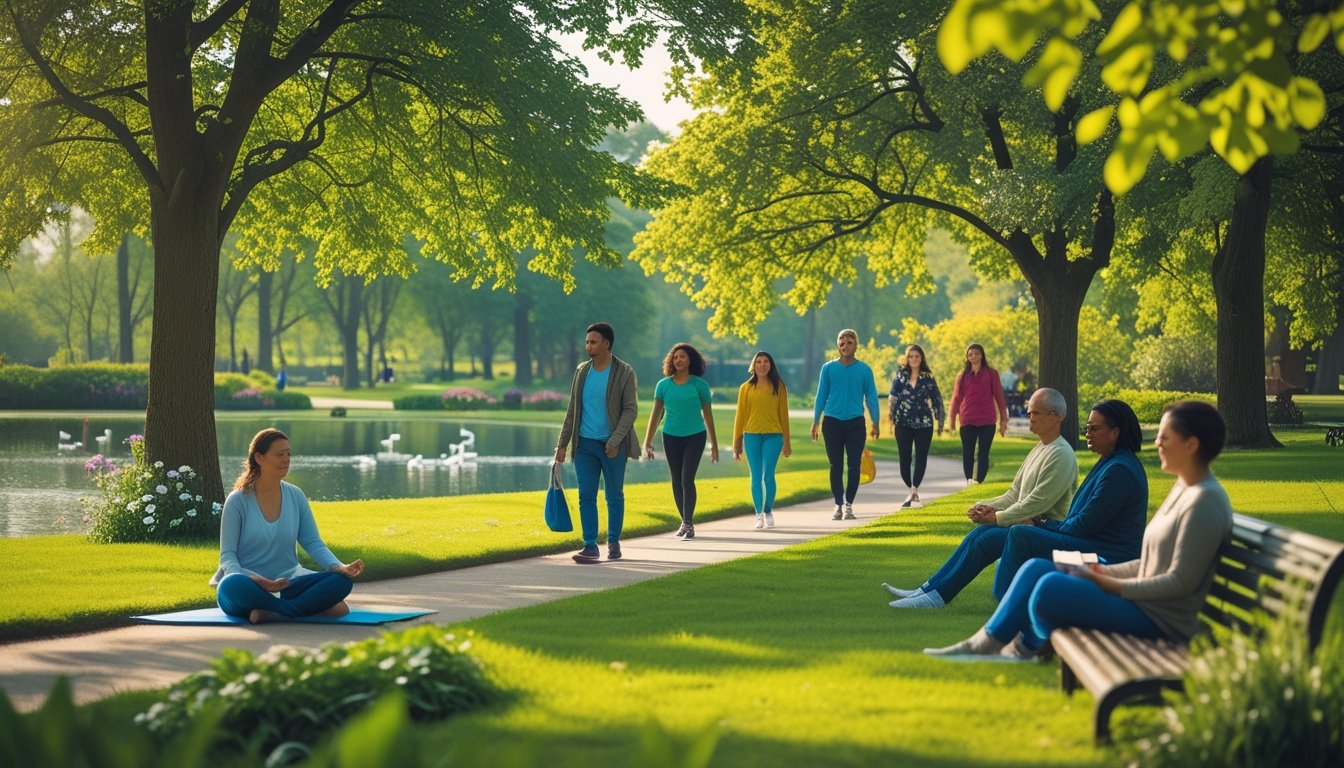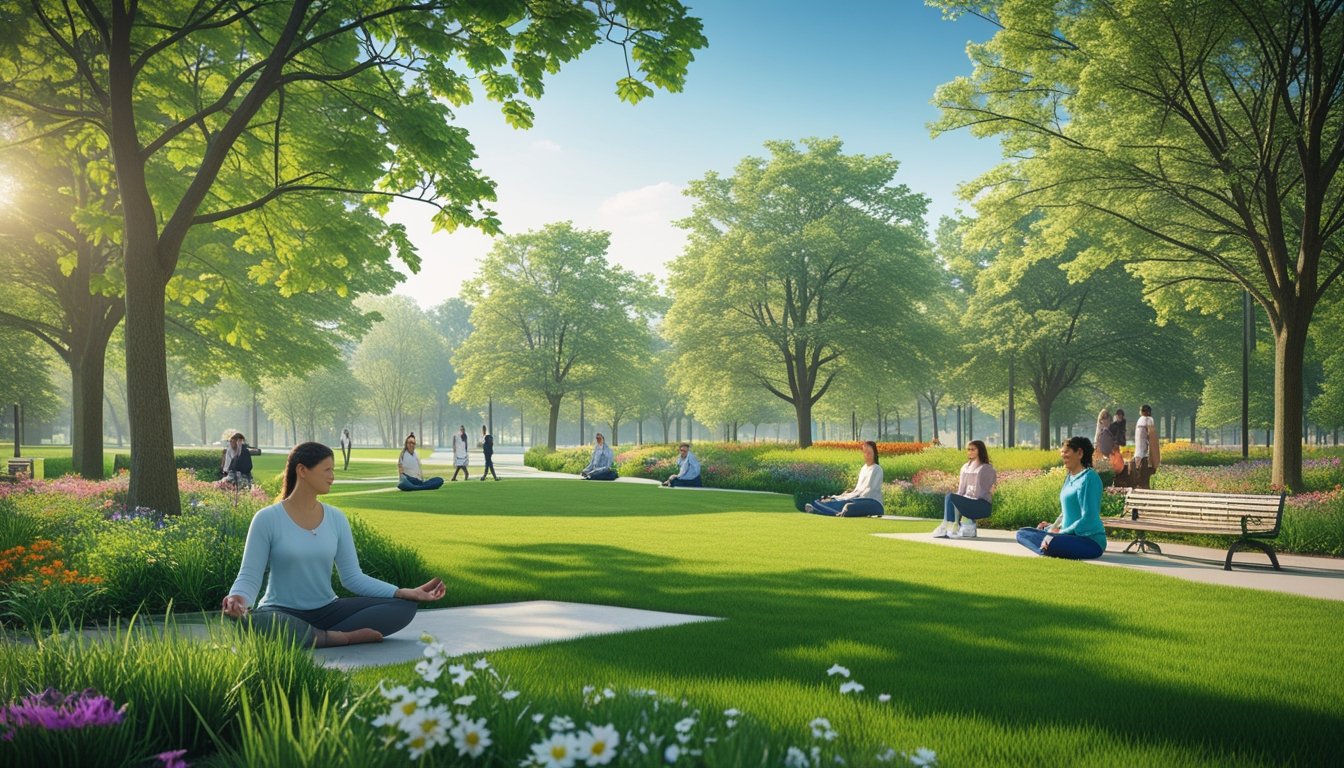Late updated: 28 Sep 2025 11:09
Written by: Ella Thompson
Exploring Green Spaces For Mental Wellbeing Benefits: A Comprehensive Overview
In today's fast-paced world, finding moments of peace and relaxation has become essential for our mental well-being. As we have explored various methods to alleviate mental stress, the serene allure of green spaces has emerged as an effective remedy. Engaging with nature not only reduces stress and anxiety but also enhances our mood and cognitive function. As urban areas expand, the incorporation of parks and green areas offers vital sanctuary-like environments where we can escape the hustle and bustle of city life.

While the benefits of green spaces for mental health are well-documented, the ways in which they influence our everyday lives remain endlessly fascinating. From improving focus and reducing physiological stress to encouraging social connections, the impact of these natural environments is profound. By examining both scientific studies and personal experiences, we gain a deeper appreciation for the nuanced ways in which nature nurtures our minds.
As we continue to explore the connection between our surroundings and mental well-being, it becomes clear that access to green spaces is more than just an amenity; it is an essential component of a healthy lifestyle. We invite you to join us in discovering how these lush havens can enrich our lives and improve our mental health.
Key Takeaways
- Green spaces reduce stress and improve mood.
- Access to nature promotes cognitive function and social connections.
- Incorporating greenery into urban areas supports mental health.
Core Mental Wellbeing Benefits of Green Spaces
Access to green spaces provides numerous mental health benefits. These areas offer not only emotional comfort but also physiological effects that enhance our wellbeing. Exploring these benefits helps us appreciate the value of nature for mental resilience and confidence.
Ways Contact with Nature Improves Mental Health
Engaging with nature offers a reprieve from the stresses of modern life. Studies have shown that spending time in green spaces, whether through leisurely walks or simply sitting in a park, can significantly reduce anxiety and depression. The natural settings encourage social interactions and community bonding, which are key to enhancing mental wellbeing. Moreover, exposure to natural environments helps lower cortisol levels, our primary stress hormone, fostering a sense of tranquillity and balance in our mental state.
Physical Effects: Stress, Sleep, and Mood
Green spaces play a crucial role in stabilising our physiological responses. By reducing stress levels, these environments help in lowering both blood pressure and heart rate. Spending time in nature also influences our sleep patterns by aligning our circadian rhythm. The natural light exposure boosts serotonin, improving mood and promoting restful sleep. The interaction with green spaces thus becomes a natural remedy for combating mood disorders and promoting overall health and resilience.
Restoring Focus and Reducing Mental Fatigue
The presence of nature aids in restoring focus and combating mental fatigue, crucial in the fast-paced environments we often find ourselves in. Natural settings allow the mind to relax and replenish, improving creative thinking and problem-solving abilities. This can be especially beneficial for those who experience overload from constant stimuli in urban environments. Whether it's through walking in a park or simply observing plants, being in nature allows our cognitive resources to rejuvenate, enhancing our ability to concentrate and perform tasks effectively.
Building Resilience and Fostering Confidence
Interacting with natural environments enhances our ability to cope with challenges, building resilience and boosting confidence. The unpredictable elements of green spaces encourage adaptive thinking. Activities in these settings, such as gardening or hiking, not only improve physical health but also affirm our capabilities and self-efficacy. Regular exposure also encourages vitamin D synthesis, which is directly linked to improved mood and mental wellbeing. By fostering a connection with nature, we lay the groundwork for a more confident, resilient self.
Access, Activities, and Social Connections in Green Spaces

Access to green spaces offers a multitude of benefits, from physical activities like walking and cycling to fostering social connections. Our daily interactions with these environments can also deepen our connection to nature and enhance our well-being. Let's explore how these aspects contribute to mental and physical health.
Opportunities for Physical Activity and Recreation
Green spaces such as parks and public lands provide excellent venues for physical activities, offering ways to keep active and healthy. Whether it’s a leisurely walk, cycling along a river path, or more adventurous activities like hiking and kayaking, outdoor spaces make exercise enjoyable.
Regular interaction with nature reduces time spent on screens and helps combat the growing issue of obesity. The fresh air and improved air quality found in these green areas promote both mental and physical health. Engaging in outdoor recreation not only allows us to exercise but also enhances our sense of well-being.
Social Interaction and Sense of Belonging
Green spaces are natural hubs for social interaction, which is crucial in addressing loneliness and building a sense of community. Parks and recreational areas serve as common grounds where social connections are easily formed. Activities like group yoga, community clean-ups, and picnics foster a sense of belonging.
The social function of these areas can lead to stronger neighbourhood ties and, consequently, a reduced sense of social disorder. By offering a shared environment, parks and similar spaces play a vital role in nurturing social cohesion.
Connecting with Nature in Everyday Life
Connecting with nature has profound impacts on mental health. By incorporating natural elements into our daily routines, we enrich our lives and improve our function and well-being. Simple actions like walking in the park during lunchtime can invigorate us and provide a respite from the indoors.
Nature-based activities, such as gardening or bird-watching, encourage conservation-minded behaviour and lifelong learning. Engaging regularly with green spaces can deepen our appreciation of the outdoors, fundamentally enhancing both happiness and life satisfaction.
Frequently Asked Questions

Exploring green spaces has numerous mental health benefits, such as reducing stress and improving mood. The recommended time spent outdoors, the impact on different demographics, and the role of community projects all contribute to mental wellness.
What are the psychological benefits of spending time in green spaces?
Spending time in green spaces has been associated with decreased mental distress and anxiety. These environments provide a natural buffer against stress and promote a sense of calm and relaxation.
How does nature exposure contribute to stress reduction?
Exposure to nature can result in lower cortisol levels, a marker of stress. Natural settings have been shown to restore attention and enhance mindfulness, contributing to a more relaxed state of mind.
What is the recommended duration and frequency of visits to parks for mental health advantages?
Regular visits to green areas, ideally two to three times a week, can significantly improve mental well-being. Each visit does not need to be lengthy; even brief periods spent in nature can have positive effects on mental health.
Can urban green spaces positively impact mood and anxiety levels?
Urban green spaces provide a sanctuary from urban stressors, improving mood and reducing anxiety. Access to parks and gardens encourages social interaction and physical activity, both of which are beneficial for mental health.
How do green spaces promote mental wellbeing in children and adolescents?
For children and adolescents, green spaces offer a chance for play and exploration, which are crucial for development. These environments encourage physical activity and social interaction, reducing symptoms of depression and anxiety among young people.
What role do community gardens play in enhancing mental health among residents?
Community gardens promote a sense of belonging and purpose among residents. Participation in gardening activities fosters social connections, reduces stress levels, and encourages healthy lifestyle choices, all of which contribute to improved mental health.
